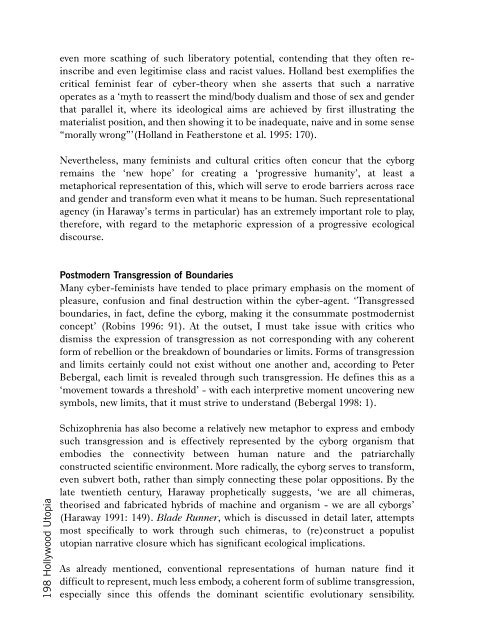Hollywood Utopia
Hollywood Utopia
Hollywood Utopia
You also want an ePaper? Increase the reach of your titles
YUMPU automatically turns print PDFs into web optimized ePapers that Google loves.
198 <strong>Hollywood</strong> <strong>Utopia</strong><br />
even more scathing of such liberatory potential, contending that they often reinscribe<br />
and even legitimise class and racist values. Holland best exemplifies the<br />
critical feminist fear of cyber-theory when she asserts that such a narrative<br />
operates as a ‘myth to reassert the mind/body dualism and those of sex and gender<br />
that parallel it, where its ideological aims are achieved by first illustrating the<br />
materialist position, and then showing it to be inadequate, naive and in some sense<br />
“morally wrong”’(Holland in Featherstone et al. 1995: 170).<br />
Nevertheless, many feminists and cultural critics often concur that the cyborg<br />
remains the ‘new hope’ for creating a ‘progressive humanity’, at least a<br />
metaphorical representation of this, which will serve to erode barriers across race<br />
and gender and transform even what it means to be human. Such representational<br />
agency (in Haraway’s terms in particular) has an extremely important role to play,<br />
therefore, with regard to the metaphoric expression of a progressive ecological<br />
discourse.<br />
Postmodern Transgression of Boundaries<br />
Many cyber-feminists have tended to place primary emphasis on the moment of<br />
pleasure, confusion and final destruction within the cyber-agent. ‘Transgressed<br />
boundaries, in fact, define the cyborg, making it the consummate postmodernist<br />
concept’ (Robins 1996: 91). At the outset, I must take issue with critics who<br />
dismiss the expression of transgression as not corresponding with any coherent<br />
form of rebellion or the breakdown of boundaries or limits. Forms of transgression<br />
and limits certainly could not exist without one another and, according to Peter<br />
Bebergal, each limit is revealed through such transgression. He defines this as a<br />
‘movement towards a threshold’ - with each interpretive moment uncovering new<br />
symbols, new limits, that it must strive to understand (Bebergal 1998: 1).<br />
Schizophrenia has also become a relatively new metaphor to express and embody<br />
such transgression and is effectively represented by the cyborg organism that<br />
embodies the connectivity between human nature and the patriarchally<br />
constructed scientific environment. More radically, the cyborg serves to transform,<br />
even subvert both, rather than simply connecting these polar oppositions. By the<br />
late twentieth century, Haraway prophetically suggests, ‘we are all chimeras,<br />
theorised and fabricated hybrids of machine and organism - we are all cyborgs’<br />
(Haraway 1991: 149). Blade Runner, which is discussed in detail later, attempts<br />
most specifically to work through such chimeras, to (re)construct a populist<br />
utopian narrative closure which has significant ecological implications.<br />
As already mentioned, conventional representations of human nature find it<br />
difficult to represent, much less embody, a coherent form of sublime transgression,<br />
especially since this offends the dominant scientific evolutionary sensibility.
















